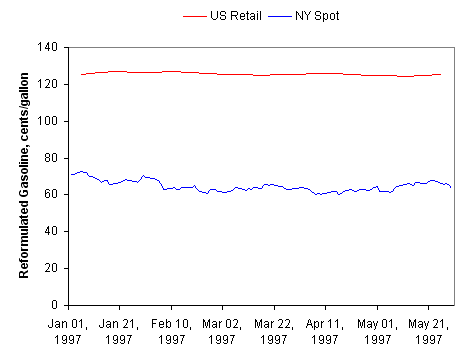Every year or two the “gas out” email arrives in my inbox. This year, it’s May 15th when “all internet users are to not go to a gas station in protest of high gas prices.” Wait – am I supposed to avoid gas stations, or protesting at gas stations? I’m amazed at the durability of this internet chain letter, which now claims a ten-year history: “In April 1997, there was a “gas out” conducted nationwide in protest of gas prices. Gasoline prices dropped 30 cents a gallon overnight.” A Monty Python tune from The Meaning of Life jumps to mind:
So remember when you’re feeling very small and insecure
How amazingly unlikely is your birth
And pray that there’s intelligent life somewhere up in space
Because there’s bugger all down here on earth.
Come on, folks. Think about the structure of the problem. Avoiding gasoline purchases on any given day has no effect, unless there’s so little gas in your tank that you can’t drive (blue link). If you do drive, you’ll simply deplete your reserves, and wind up buying more gas the next day (red link).
For the gas out to work, you have to forego using gas. Not just for a day, either – if you save your driving for the next day, net consumption winds up the same over the long haul. You have to permanently eliminate the day’s driving, for example by riding your bike, combining trips, or spending your gas money on something else. Even then, don’t expect any gas price miracles from a 0.27% reduction in annual demand – there certainly wasn’t one in 1997:
If I owned a gas station, I’d jack up the price on May 16th, to catch all the “gas out” suckers coming in for a post-protest fillup.


